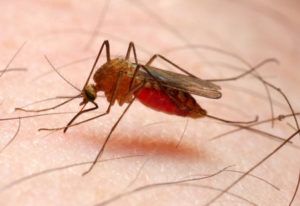 As we’ve seen in recent news, travelling to a country where disease-carrying mosquitos thrive can have lasting repercussions. The Aedes mosquito is responsible for the transmission of viruses like Dengue, Chikungunya, and Zika. Malaria, on the other hand, is transmitted by the Anopheles mosquito, and it isn’t a virus.
As we’ve seen in recent news, travelling to a country where disease-carrying mosquitos thrive can have lasting repercussions. The Aedes mosquito is responsible for the transmission of viruses like Dengue, Chikungunya, and Zika. Malaria, on the other hand, is transmitted by the Anopheles mosquito, and it isn’t a virus.
Malaria is a caused by the Plasmodium parasite, which is picked up from infected people by female mosquitos. When the mosquito bites again, it transmits the parasite, now mixed with the mosquito’s saliva, to the blood of its victim.
There are four types of human malaria, of which the deadliest is Falciparum malaria, which is responsible for close to one million deaths in Sub-Saharan Africa every year.
Malaria symptoms usually come on one to two weeks after being bitten, and are flu-like in nature. They include fever, chills, vomiting and headaches. If the person does not receive proper treatment the parasite can be deadly, killing the host by destroying red blood cells and obstructing the arteries.
Avoid contracting malaria during your travels by following these five simple steps:
- Research your destination
As the NHS states, no one is completely immune to malaria, so even if you are originally from a place where malaria is prevalent, precautions must be taken. To find out if the country you plan to visit has areas at risk, visit the Fit for Travel website. - Get Malaria prevention tablets, if required
The aforementioned websites will advise you as to whether malaria tablets are recommended for your destination. The prescribing doctor can advise you as to the right type of tablets for your needs and on any side effects that you should anticipate. - Take your tablets as directed
You will need to take your malaria tablets a few days or up to 10 days before setting off on your trip. They will need to be taken regularly with food or after a meal, and for up to 4 weeks after you return from the malaria area. Failure to take your tablets as prescribed can have a serious impact on their effectiveness. Read the instructions carefully for your chosen antimalarials. - Prevent Mosquito bites
There is no better first line of defence than preventing yourself from getting bitten, day and night. Prepare before you go, considering permethrin-treated clothing and sleeping nets, and mosquito spray containing Deet. Layer on sunblock before systematically covering your skin with mosquito spray, and re-apply both after sweating, swimming, or towelling. You’ll also want to try to choose accommodations with air conditioning and/or proper screens. Do not rely on popular remedies such as taking garlic or vitamin B. - Be vigilant for symptoms
Aside from continuing to take your malaria tablets for as long as prescribed, keep in mind that although the incubation period for malaria is normally just seven to 18 days, in certain cases symptoms may not surface for up to one year. Remember that you have visited a malaria-risk area and seek medical advice if you exhibit signs of having the parasite.
The NHS also offers a guide for preventing malaria using the ‘ABCD’ approach.



